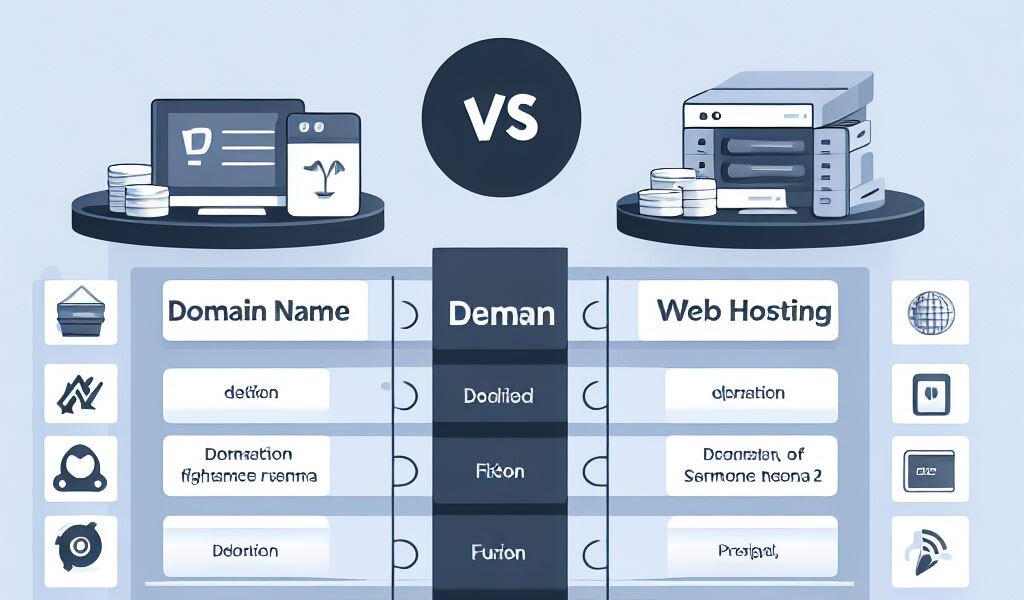In the digital age, establishing an online presence is essential for businesses and individuals alike. Creating a website is a fundamental step in this process, but it involves a variety of technical components. Two of the most critical elements in building a website are the domain name and web hosting. While they both play pivotal roles in making your website accessible on the internet, they serve different purposes and are often confused. In this blog post, we will delve into the key differences between domain names and web hosting, shedding light on their individual functions and how they work together to bring your website to life.
Domain Name
Definition
A domain name is essentially the address that people type into their web browsers to access your website. It serves as a user-friendly, human-readable representation of the website’s IP address, which is a numerical code that identifies the server where your website’s data is hosted. Domain names make it easier for people to remember and access websites without having to type in complex numeric sequences.
Unique Identifier
Domain names are unique identifiers on the internet, ensuring that no two websites have the same domain. For example, “www.example.com” and “www.mywebsite.com” are distinct domain names that lead to different websites.
Registration
To obtain a domain name, you need to register it through a domain registrar, a company authorized to sell and manage domain names. Registration is typically an annual fee, and you have the option to renew your domain name each year to retain ownership.
Top-Level Domain (TLD)
A domain name consists of two main parts: the top-level domain (TLD) and the second-level domain (SLD). The TLD is the part that comes after the dot (e.g., .com, .org, .net), and the SLD is the part before the dot (e.g., example in www.example.com). The choice of TLD can be significant, as it can indicate the type of organization or the geographical location of the website.
DNS (Domain Name System)
The Domain Name System is a distributed database that translates human-friendly domain names into IP addresses. When a user enters a domain name into a web browser, the DNS resolves the domain to the corresponding IP address, allowing the browser to retrieve the web page from the hosting server.
Web Hosting
Definition
Web hosting, on the other hand, is the service that makes your website’s files, data, and content accessible on the internet. It involves storing your website’s code, images, and databases on a server connected to the internet, making them available to visitors who access your domain.
Storage and Server
Web hosting providers offer server space and infrastructure for your website’s data. They maintain powerful servers that store and serve your website’s files to users when they request it. Web hosting providers may offer various types of hosting services, including shared hosting, virtual private servers (VPS), dedicated servers, and cloud hosting, each with its own benefits and limitations.
Bandwidth
Web hosting providers also offer bandwidth, which determines the amount of data that can be transferred between your website and visitors. If your website experiences high traffic, you’ll need sufficient bandwidth to ensure fast loading times and a smooth user experience.
Technical Maintenance
Web hosting providers take care of technical maintenance tasks, such as server updates, security, and backup management. This allows website owners to focus on creating and updating content without having to worry about the underlying infrastructure.
How Domain Name and Web Hosting Work Together
To illustrate the relationship between domain names and web hosting, consider the following analogy: the domain name is like the address of your house, and web hosting is the actual house where you store your belongings. When someone enters your domain name in a web browser, the DNS system directs them to the hosting server, which then delivers the website’s content to their browser.
In summary, while domain names and web hosting are distinct components, they are interdependent in the process of making your website accessible on the internet. Your domain name directs users to your web hosting server, where the website’s files and data are stored. In this way, they work together to create a seamless online experience for your audience.
Understanding the fundamental differences between domain names and web hosting is crucial for anyone looking to establish an online presence. By grasping their respective roles and how they collaborate, you’ll be better equipped to make informed decisions when building and maintaining your website.
